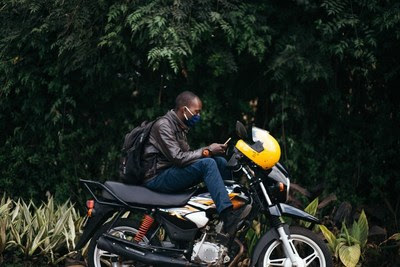Partnership expands financing options for African entrepreneurs through Smart Asset Financing™
KAMPALA, Uganda, Dec. 2, 2021 /PRNewswire/ — Untapped Global, an innovative investment company focused on emerging markets, announced today a scale up of its partnership with Asaak, a financial services provider to unbanked Ugandan entrepreneurs, to provide financing for over 2,000 motorcycles over the next 12 months.

The partnership will revolutionise motorcycle leasing in Uganda, by leveraging the rapid digitization happening across the continent. In the past, access to money-making assets such as motorbikes was limited to those who could afford to purchase them in full, and markets were dominated by informal lenders. Now, companies like Asaak are digitizing the lending process, making it safer and easier for entrepreneurs to lease and finance their own assets – a key to economic development on the continent.
Asaak offers financial services via a digital platform to entrepreneurs who otherwise would not have access. Asaak’s boda boda (motorbike) financing program approves drivers for loans based on financial and behavioral data, such as the number of trips completed on mobility apps, including Bolt (Taxify), Safeboda, Uber and Jumia. Most boda drivers rent motorcycles because they cannot afford to buy one in cash, nor do they have the formal credit or income history to qualify for a bank loan. This is where Smart Asset Financing™ comes in.
Untapped Global’s Smart Asset Financing investment model finances revenue-generating assets for entrepreneurs and SMEs in the world’s fastest-growing emerging markets, such as Uganda, Kenya, South Africa, and Mexico. Untapped and Asaak had a successful initial pilot in November 2020 to finance 40 motorbikes, and this month, Untapped signed on to provide scale-up financing for over 2000 vehicles in the next 12 months.
The pilot and scale up prove Untapped Global’s innovative Smart Asset Financing model offers great potential for follow-on funding for growing partners. The company uses real-time IoT data for the assets it finances to track key metrics such as usage and revenue, allowing for faster due diligence. While Asaak’s fast growth and expansion have enabled an equally fast scale-up of investment from its financing partner.
“Mobility is an important driver of economic development in Africa, and digitizing financing for boda bodas is key to making transport more accessible and affordable,” says Jim Chu, Founder and CEO at Untapped. “We look forward to providing the financing to help Asaak scale their business as much as they, and their entrepreneurs, need.”
“Our goal at Asaak is to make it easier for gig economy workers across Africa to access sustainable financial services,” Dylan Terrill, Chief Business Officer of Asaak said. “The team at Untapped is aligned with that goal and our growing partnership underscores the dedication to ensure that business owners have the opportunity to reach their full economic potential.”
Untapped Global is currently running a crowdfunding campaign on Wefunder to enable any investor large or small to participate in the movement to empower entrepreneurship around the world.
About Untapped Global
Based in San Francisco with teams in East Africa, West Africa, the Caribbean, and Europe, Untapped Global is reshaping profitable investing in frontier markets. On a mission to empower the next billion entrepreneurs to scale to their full potential, Untapped creates opportunity by connecting frontier market innovators to global investors through its Smart Asset Financing™ platform that provides CAPEX financing for revenue-generating assets. Press or other inquiries please reach out to Lundie@untapped-global.com.
About Asaak
Asaak is an African fintech company that provides asset financing to entrepreneurs across Africa. In 2019, they launched a motorcycle financing product for taxi (“boda”) drivers in partnership with the country’s largest ride hailing apps: Jumia, Uber, SafeBoda, and Bolt. Asaak is backed by leading American and African VCs (Resolute Ventures, Social Capital, 500 Startups, HOF Capital, Catalyst Fund). For more information, visit www.asaak.com or contact press@asaak.com

Photo – https://mma.prnewswire.com/
Logo – https://mma.prnewswire.com/
